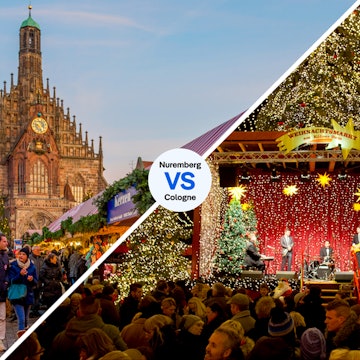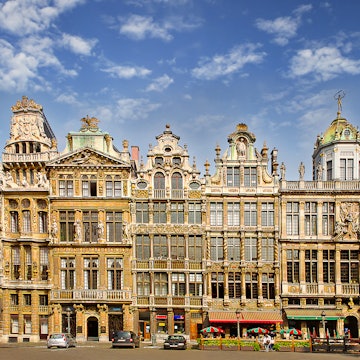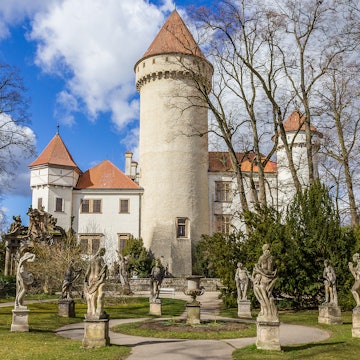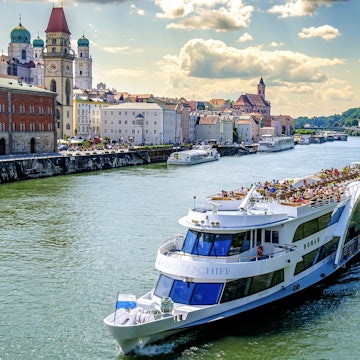

There are many great things to do in Prague for free, like enjoying the atmospheric Letná Gardens. Petr Pavlica / Shutterstock
Prague is no longer the budget city break it used to be. While the beer remains refreshingly cheap, big-ticket attractions such as St Vitus Cathedral, Strahov Library and the Prague Jewish Museum now require visitors to dig deeper into their pockets.
Luckily, there’s still plenty to enjoy in the Czech capital for travelers on a budget – no matter how small it may be. Here’s our pick of the very best free things to do in Prague.
1. Soak up the vibes on the Charles Bridge
It may be one of Prague’s most iconic attractions, but the 650-year-old Charles Bridge doesn’t cost a penny to cross. Stroll along its stone cobbles to admire rows of baroque statues, enjoy armies of buskers and artists, and take in the spectacular spires and domes on both sides of the river.
Planning tip: For a great view of the full 500m (1640ft) span of the stone-arch bridge, head to the riverbank behind the Franz Kafka Museum.
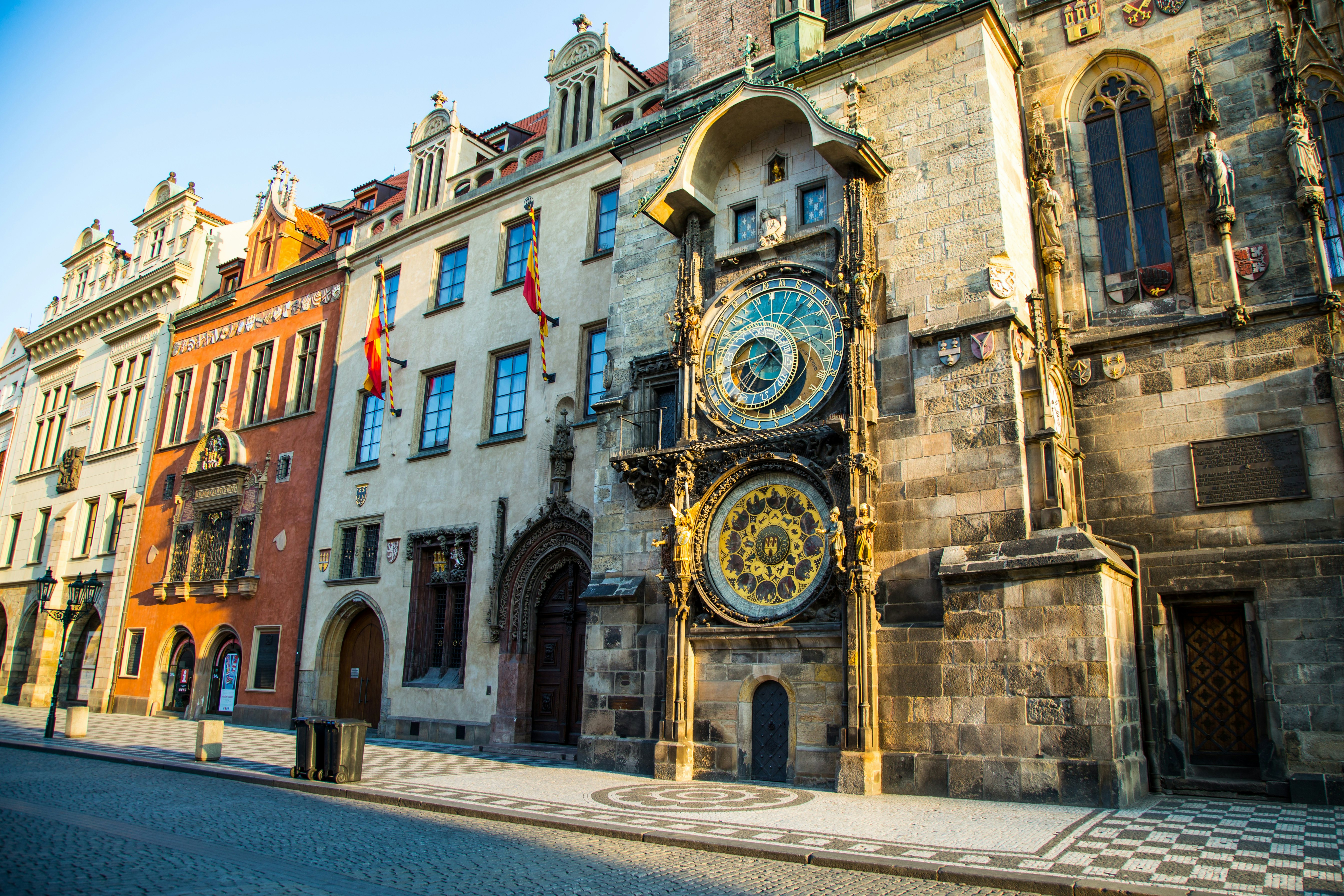
2. Admire the Astronomical Clock
Another famous city landmark, the Astronomical Clock, is one of the most popular free things to do in Prague – yet its on-the-hour procession of mechanical figures leaves some tourists a little underwhelmed. So instead, come here between showtimes for a closer look at the clock itself.
As well as being intricately beautiful and rich in symbolism, the two clock faces are also fonts of information. They tell you the time (look for the point where the golden hand meets the Roman numerals), the day and month of the year, the zodiac sign, the times of sunset and sunrise, the current phase of the moon and so much more. Not bad for a clock first installed in 1410.

3. Tour David Černý's public artworks
When it comes to provocative modern art in Prague, one sculptor reigns supreme: David Černý. The artist is perhaps best known for his work Entropa, a huge sculpture depicting EU states as crude stereotypes (like France on strike and Romania as a Dracula theme park), which, after causing just the smallest amount of controversy, is no longer on display. However, many of the artist’s other works dot the streets of Prague, and – to make things even sweeter – are completely free to enjoy.
Highlights include Kůň, in the middle of the Lucerna Palace shopping arcade, which depicts a lifeless, upside-down horse ridden by an inattentive King Wenceslas; K, a gigantic rotating metal bust of Prague writer Franz Kafka, located above Národní třída metro station; and Miminka, a series of faceless babies crawling up Žižkov’s TV Tower. You can also find some ground-level miminka (babies) on the small river island of Kampa.
4. Climb Petřín Hill for fantastic city views
Topped by what looks like a pint-sized Eiffel Tower, Petřín Hill is one of Prague’s most popular playgrounds. Come for the woodland walkways, blooming rose gardens and gorgeous views of the city below – and don’t miss the Hunger Wall, a structure built in 1362 that takes its name from the claim the wall was, purportedly, built not for strategic value, but as a means to provide income to Prague’s starving population following a famine.
Planning tip: You can hike up and down Petřín or hop on the 19th-century funicular; it’s part of the public transport network, so a free add-on to any tram or metro journey for those with a valid one- or three-day travel pass.

5. Wander the grounds of Prague Castle for free
While you have to pay to visit most of Prague Castle’s lavish interiors, including St Vitus Cathedral, you are free to roam the grounds and gardens for, well, free – just remember to bring your ID to get through security. You’re also free to discover the quaint Golden Lane – where writer Franz Kafka lived for a spell – after the stalls have closed and an alluring quietness falls over the historic thoroughfare.
Planning tip: Exploring the castle's courtyards is best at night, as the crowds typically thin out in the early evening, but the gates remain open until late.
6. Stroll the cobbles of Nový Svět Quarter
Combine your trip to Prague Castle with a wander around the "New World." Although just a short walk northwest of the castle complex, this picturesque quarter feels like a world away, with its strollable cobblestone streets, pastel-shaded 16th-century houses and remnants of the old city walls.
Planning tip: It’s also home to a small garden, a children’s play park and a charming little cafe.
7. Take a tour around Vyšehrad Citadel
Like Prague Castle, the Vyšehrad Citadel is perched on a hilltop, served as a former royal residence and is also dominated by an important church that overlooks the Vltava river. Unlike Prague Castle, however, it’s free to visit.
As well as exploring the exquisite Church of Sts Peter and Paul, you can walk the Citadel’s walls for fantastic views over the city and visit the Gothic Vyšehrad Cemetery, burial place of notable Czechs like Dvořák, one of the first Czech composers to achieve global fame, and Mucha, a renowned artist who painted The Slav Epic, a series of 20 giant canvases depicting the history and mythology of the Slavic peoples (a dedicated Prague gallery is supposedly in the works to house it).
Planning tip: In the summer, Vyšehrad has one of Prague’s best beer gardens.
8. Be dazzled by the entrance hall at Municipal House
Connected to the tall, Gothic Powder Gate that marks the entrance to the Old Town, Prague’s Municipal House is a masterpiece of art nouveau architecture. While the upstairs halls are only available by (paid) guided tour, budget-conscious travelers can still enjoy the dazzling facade, complete with a grand entrance mosaic, as well as the ornate foyer, for free.
Planning tip: There’s also a chandelier-stuffed cafe here.

9. See what outfit the Infant Jesus is wearing
First brought over from Spain in 1628 and believed to possess miraculous healing powers, the Infant Jesus remains a site of pilgrimage for Christians – and a great thing to see on a Sunday.
The 47cm-tall (19-inch) waxwork of baby Jesus is adorned in a vast and ever-changing array of colorful costumes to rival Brussels’ Manneken Pis. You will find the statue, plus a free museum showcasing many of its most elaborate frocks, in Malá Strana’s Church of Our Lady Victorious.
10. Follow the paths in Letná Gardens for panoramic views
Prague has a high number of green spaces for a big city, from the lake-filled Stromovka Park to the statue-lined Wallenstein Garden. But for a mix of winding paths, beer gardens and wide open spaces, it’s hard to beat Letná Gardens.
Climb the steep staircase from the Čechův Most tram and stop for a slow reveal of a remarkable Prague panorama, taking in the Vltava River, Prague's bridges and the city’s rooftops. At the top, you’ll come across a giant plinth that once supported a colossal statue of Stalin (which was destroyed by dynamite). Today, a striking 75ft (23m) metronome (a machine that makes an audible click every second or so) stands in its place – an ode to that age-old adage: in time, all things pass.
11. Admire the interiors of Týn Church
The Czech Republic is among the most secular countries on earth, yet its capital is jam-packed with majestic churches from centuries past – and many are free to enter (though donations will be gratefully received). One of the most photographed is the Church of Our Lady Before Týn, a twin-spired Gothic masterpiece looming over the Old Town Square.
Step inside to explore a bold baroque interior, including a 17th-century altar and the tomb of pioneering Danish astronomer Tycho Brahe, who is also notable for sporting an artificial nose throughout most of his life (his original sniffer being partially sliced off in a sword duel with a contemporary over who was the better mathematician).
12. Stroll up Vítkov Hill
While a trip up the futuristic masterpiece/looming eyesore (delete as appropriate) TV Tower will set you back a pretty penny, similarly sweeping vistas over Žižkov and Karlín can be enjoyed from the nearby Vítkov Hill. The National Monument may have an entrance fee, but it costs you nothing to gaze up at the mammoth Jan Žižka statue or to stroll the tree-shaded hilltop paths.






